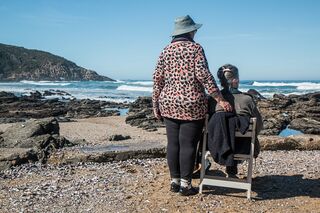Bias
What Does the Future Hold for LGBTQ+ Seniors?
The assisted living industry has a long way to go to be LGBTQ+ inclusive.
Posted June 27, 2021 Reviewed by Jessica Schrader
Key points
- LGBTQ seniors face unique challenges of discrimination, financial restraints, and a lack of family support as they age.
- Existing long-term care and assisted living infrastructure fails to adequately address the needs of LGBTQ seniors.
- Creative solutions are emerging to help meet the needs of LGBTQ seniors, including social groups and LGBTQ-specific senior's housing.
This entry was co-authored with two students from Trent University: Laura Orchard and Bre O'Handley.
The queer trailblazers who were in their 20s and 30s at the time of the Stonewall Riots in 1969 are now in their 70s and 80s and considering what the future holds for them in their golden years. While decisions about moving into assisted living facilities are challenging for all seniors, LGBTQ seniors are faced with the additional burden of questioning whether such facilities will be LGBTQ-friendly. Indeed, in a recent interview with PBS News, Patrick Mizelle and Edwin Fisher discussed their concerns about their future after having spent 37 years together. The couple has been out to the world for decades and they have spent much of their life actively involved in the LGBTQ community, from raising funds for LGBTQ causes to marching side-by-side in pride parades. But recent visits to local senior’s homes left the men wondering if they had “come this far only to have to go back in the closet and pretend [they] are brothers.”
Unique Challenges for LGBTQ Seniors
Despite the growth of the long-term care and assisted living industry, the needs of LGBTQ seniors are still far from being well-addressed by most facilities. Nearly half a century after Stonewall, Dave Singleton wrote it best, “we’re still in the early stages of grasping what it really means to be LGBT and older.” By 2030, the last of the baby boomers will have turned 65; this means that older adults will soon make up a fifth of the population. Getting older isn’t easy by any degree, but it’s far more difficult to age with pride when you’re among a population that earns an average income at or below the national poverty line, as is the case for many LGBTQ seniors. Furthermore, elder same-sex couples are less likely to be legally married than elder heterosexual couples, a difference that is not surprising when you consider that most would have been in their 50s or 60s by the time same-sex marriage was legalized in Canada (2005) or the USA (2015). This can limit the financial resources accumulated over their lifespan, as for most of their lives spousal benefits were unavailable and if they haven't legally married they may still be lacking the financial support available to married couples (e.g., no inheritance tax when one partner dies). A recent MassMutual LGBTQ Financial Security survey found that 70% of LGBTQ participants were fearful of 'outliving their retirement savings.'

The primary source of support and care for most seniors remains adult children, but LGBTQ seniors, especially those of the baby boomer generation, are much less likely to have adult children and are more likely to be single than their heterosexual counterparts. LGBTQ seniors far too often experience strained family relationships and as a result, are more likely to rely on members of their ‘chosen family’ (people they feel are family even if they are not blood-related) for support. With less family care available, LGBTQ seniors today are even more likely to require some form of assisted living in their later years, but this process is wrought with concerns about prejudice and discrimination.
Fear of Discrimination
Similar to the concerns expressed by Patrick and his partner Edwin, a recent survey conducted by the American Association of Retired Persons found that over a third of LGBTQ participants indicated that one of the key factors influencing their decision to not move into an assisted living setting was their concern that they would need to go back into the closet and deny their sexual or gender identity. Such concerns are not unfounded. Research on discrimination faced by LGBTQ seniors living in long-term care facilities found that during a single eight-month time period, there were 853 incidents of anti-LGBTQ harassment or refusal of staff to provide care for LGBTQ seniors. These numbers may just be the tip of the iceberg, as many existing LGBTQ seniors are already closeted and may not feel comfortable reporting incidences of discrimination.
Patrick and his partner Edwin cannot imagine being forced to live apart after such a long life together. However, some LGBTQ seniors have reported being separated from their life-long partner(s), only to be forced to room with an unfamiliar face. LGBTQ seniors have also reported being evicted or down-right denied housing because of issues related to their sexual identity. While a few long-term care and assisted living facilities provide training to staff on LGBTQ issues, this is not a guarantee that all staff will treat LGBTQ treat residents with equal care. Beyond discrimination within facilities, LGBTQ elders have unique needs due to the hurdles they have navigated their entire lives in a society that only recently began to accept them and provide equal rights. An Aging With Pride article documented that higher incidences of lifelong discrimination and victimization were associated with poorer overall health, increased depressive symptoms, and greater disability among LGBTQ seniors.
In today’s society, as individuals get older, they are often forced to trade in their caregiving roles and become the recipients of care from adult children or strangers. Much of the aging process forces the narrative of ‘losing control,’ whether it be control over what one wants to do with their day versus what they are capable of doing, or the sense of loss related to one's cognitive, physical, and psychological capacities. Each of these losses contributes to an increase in isolation among the LGBTQ elder population who must face not only the regular feats of aging but also a legacy of economic, social and legal burdens and discrimination. What does this mean for the future of the aging LGBTQ community?
The Future of LGBTQ Senior Care
Despite the challenges, many creative solutions are beginning to emerge with the goal of ensuring that the LGBTQ trailblazers alive today live out their final years with dignity and respect. In the past, the most popular method of addressing LGBTQ elder disparities was the implementation of anti-discriminatory policies and LGBTQ-related implicit bias training, but the impact of these policies can be marginal. A growing body of research now suggests that aging LGBTQ individuals prefer the notion of creating separate LGBTQ assisted living facilities. One study found that over half of its LGBTQ sample reported favouring LGBTQ-specific services, such as LGBTQ assisted living communities or wings within existing communities.
More creative solutions are being put forward by organizations focused on specifically serving the needs of LGBTQ Elders. Olivia Travel, a company that provides worldwide travel for lesbian women, developed the OWL (Older, Wiser Lesbians) program, in which they offer special social programming for lesbians over the age of 60 where they can come together to share their experiences and plan for the future. Others have made the move to increase LGBTQ social support aimed at seniors in assisted living communities, including LGBTQ clubs, group therapies, and LGBTQ-themed extracurricular activities, such as attending local pride festivities. Yet, while these new developments are promising, they often remain out of reach for LGBTQ seniors not living in major urban centres that have existing LGBTQ communities to facilitate such programming. But with a little effort and acknowledgment of the issues, any retirement community has the means to be LGBTQ positive. The good news is that many organizations are beginning to recognize this need and to provide services aimed at LGBTQ seniors so that the generation who fought for LGBTQ liberation will continue to enjoy the spoils of their efforts throughout their final years. Ultimately, the best assurance that all future LGBTQ seniors will be treated with dignity and respect is for members of the LGBTQ community today to get involved and ensure that the needs of our elders today are being met and exceeded—after all, we owe them a debt of gratitude for the LGBTQ rights and freedoms that exist today.
References
Rainbow Table: Connecting 2SLGBTQI Seniors - EGALE Canada
Financial Planning for LGBTQ2+ Seniors - EGALE & TD Canada Trust
Housing As a Key Determinant of Health for Older LGBT Canadians - Presentation
Nova Scotia LGBT Seniors Archive - Dalhousie University
Senior Pride Network - Older LGBTQ Resources in Canada
Aging Out: Moving Towards Queer & Trans* Competent Care for Seniors


